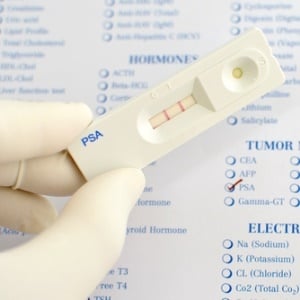
Prostate specific antigen (PSA) is a protein made in the prostate gland. It is added to semen which it liquefies, allowing sperm to swim freely. It is also thought to help dissolve cervical mucus, permitting sperm to enter the uterus.
Why is measuring PSA important?
Normally, PSA is found in the blood in small quantities, some of it as free molecules, but most of it bound to blood proteins.
The amount of PSA in the blood is proportional to the mass of the prostate. It is known that blood PSA increases with age; this is related to the increase in prostate size. This 'normal' enlargement may cause unpleasant symptoms, but is not life-threatening, and is called benign prostatic hypertrophy (BPH).
Prostate cancer also causes enlargement of the gland. Here, because the cells in the cancerous gland are disrupted, most of the PSA they release into the blood is still in the 'bound' form.
Measuring blood PSA can indicate the amount of prostatic enlargement. By measuring the free vs bound PSA, it can also alert one to the possibility of the enlargement being due to cancer, so that other tests can be done. Follow-up PSA testing can be used to monitor progress.
How is the test done?
The test is a simple blood test, using a small amount of blood taken from a suitable vein, usually in the arm. Standard techniques are used in which the puncture site is carefully cleaned before blood is drawn, and is covered with a clean dressing afterwards. No special restrictions apply after the test.
What factors affect the test?
There are some 'innocent' factors known to increase PSA levels, so for the 48 hours before the test, patients must avoid ejaculation and bicycle-riding.
A digital rectal examination - part of the screening for BPH and prostate cancer - can also raise the PSA, but only minimally, and for a very short time.
Any patient with a prostate infection must be retested after completing an appropriate course of antibiotics.
Acute urine retention causes a large rise in PSA, so the test should be delayed for two weeks after the retention is relieved, for the results to be reliable.
Measuring PSA in obese patients needs special mention. As body weight increases, so does the total blood volume. Any PSA produced is thus diluted in a greater volume, giving a lower reading than would be obtained for the same amount of PSA in a thinner person with a smaller blood volume. This implies that obese men with 'normal' PSA levels may have enlarged prostates, or even prostate cancer, but are not further investigated because of this false sense of security.
Normal values
As a general rule, values above 4ng/mL are considered abnormal, warranting further investigations.
Age range - years | PSA value ng/mL |
40 - 49 | 0 - 2.5 |
50 - 59 | 0 - 3.5 |
60 - 69 | 0 - 4.5 |
70 - 79 | 0 - 6.5 |
Causes of high PSA
There are four recognised important causes of a high PSA:
- Benign prostatic hyperplasia (BPH) which is a harmless enlargement of the prostate usually seen in older men. This causes difficulty in emptying the bladder, leading to frequent urination and discomfort, and disrupted sleep. Treatment by a specialist urologist may include medication and/or surgery to relieve symptoms.
- Prostate cancer - if the PSA test suggests this, the patient must immediately be referred to a urologist for further tests, specifically biopsy. If cancer is proven, treatment option may include surgery, radiotherapy, chemotherapy and hormone therapy.
- Prostate inflammation - most often due to acute or chronic bacterial infection. Prolonged antibiotic treatment may be needed.
- Prostatic trauma - straddle injuries may be seen, but excessive bicycle riding can also raise PSA values
Other investigations
If cancer is suspected, then other general blood tests may be done, for instance, a full blood count to check for anaemia, infection and the status of protective white cells.
The most important test to confirm cancer is a biopsy of prostate tissue. This is a procedure done by a specialist. If cancer is confirmed and treatment begun, then serial PSA measurements can be used to track the patient's progress, identify the need to change treatment, or to signal the recurrence of cancer after treatment.
Risks
The risks of any blood test are:
- Excessive bleeding from the puncture wound,
- Bruising,
- Haematoma formation - a lump due to bleeding under the skin, and
- Infection.
Most problems that do occur are from the other investigations which are needed as a result of the PSA test (for instance, pain from the biopsy) and not form the PSA test itself.
(Dr A G Hall)




 Publications
Publications
 Partners
Partners











